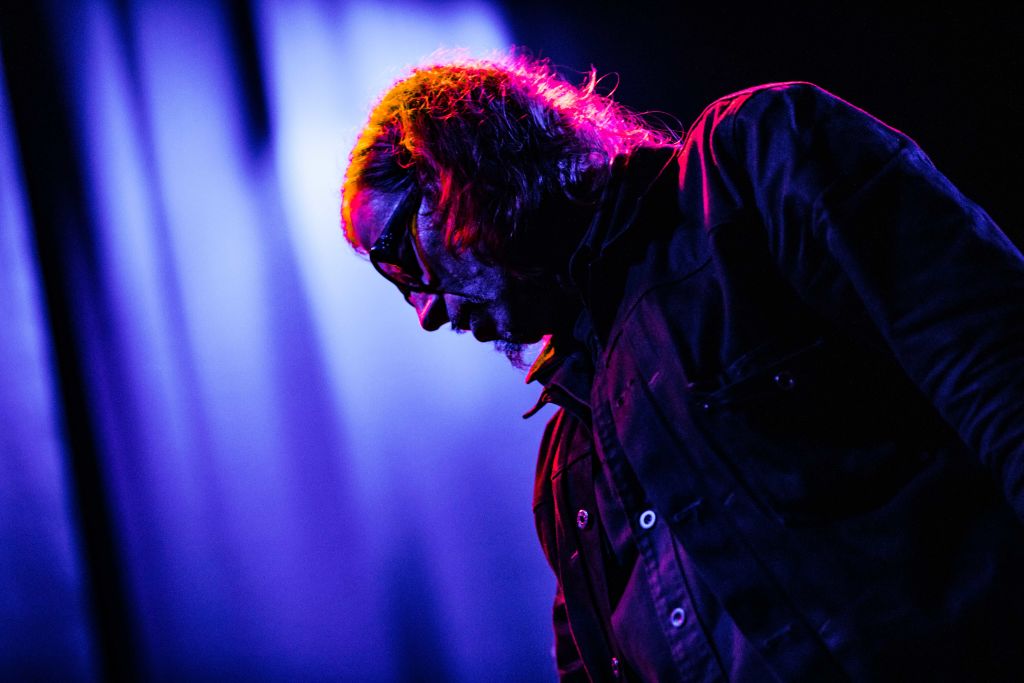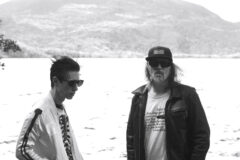It all starts innocently enough, with Seattle-bred rocker and now author Mark Lanegan apologizing profusely for missing our scheduled interview three hours earlier.
Ostensibly, he had been planning to discuss his new tell-all autobiography, Sing Backwards and Weep, and the stark, skeletal album, Straight Songs of Sorrow, that its cathartic writing inspired. But, like a line of dominoes toppling, one simple question — Where had he and his wife Shelley Brien been in the interim? — led to another, then another, until he went tumbling down a surreal rabbit hole over a 90-minute conversation that ran the gamut of, among other things, serious coronavirus-related subjects that concerned him. The kind of far-reaching interview one could only conduct in our current pandemic-constricted, shelter-in-place situation, without publicists.
The book certainly deserves scrutiny.
Published by Da Capo Press, Lanegan was urged to write it by his late friend Anthony Bourdain. It unflinchingly tells the musician’s hardscrabble story from his early days in backwater Ellensburg, Washington as he drifts from a teen gambler and porn fiend to petty criminal (charged with vandalism, drug possession, breaking and entering) and reluctant grunge-rocker in the Seattle’s seminal Screaming Trees.
He was friends with Nirvana mastermind Kurt Cobain but regrets not answering several of his calls on the day he died. This takes place while in the shadow of his ongoing heroin addiction, the monkey he just couldn’t shake from his back, even as he found post-Trees work with Isobel Campbell, Queens of the Stone Age, his pal Greg Dulli in The Gutter Twins, and a solid solo career.
But it’s Straight Songs of Sorrow that clarifies his respected position in the post-grunge pantheon. It starts out with the lugubrious “I Wouldn’t Want to Say,” his voice undertaker-menacing as he intones “Get out while you can…my heart is black as night.” And the path, which parallels events in the memoir, just grows darker and more ominous from there, as on “Apples From a Tree” (“I’m too far out at sea/ And you’re on the shore”). “Ketamine” (“So I can feel alright,” he lyrically explains), “Bleed All Over” (“I wanted one thing to believe in”), “Stockholm City Blues” (which finds him staring out his Swedish hotel window at a stormy night, but he’s compelled to go out into it anyway), “Skeleton Key” (“I’m ugly inside/ Why did you ever love me?”), “Ballad of a Dying Rover” (“I’m just a sick, sick man”), and the closing duet with Crime and the City Solution’s Simon Bonney (which ends things on an up note with “Daylight’s calling me/ I’m so glad to be free”). Adding their talents to the proceedings: Dulli, Ed Harcourt, Portishead’s Adrian Utley, Lamb of God guitarist Mark Morton, John Paul Jones, and Peter Hook’s son, Jack Bates, on bass.
But the cavalcade of queries begins with where the couple had been — out in a rental car, taking care of business before hightailing it back to their Los Angeles-area hideout. Why a rental car? Lanegan had totaled his own car on Easter Sunday, while on a mission to procure insulin for one of his two miniature Australian shepherds. Was it high-speed? No, it occurred at 10 miles per hour, as he dropped a cigarette into his box of rubber gloves under the front seat and reached down to grab it.
Was it easy to put behind him? No, the 55-year-old singer sighs.
“It was a parked car I hit, and it was the third time this guy’s car had been hit while being parked in the same place. So he was not pleased — instead of exchanging insurance info, he made the police take a full report, and it took over two hours.”
SPIN: What else has been difficult?
Mark Lanegan: It’s all about this 5G shit, and they’re going up hot and heavy around here. They’re putting ‘em up, getting ‘em ready to go. And T-Mobile — who I’ve been with for 16 years, my wife for 15 years — they have their 5G stuff all over the place, too. But when she called to pay her bill a few weeks ago, they said, “No, it’s been paid already.” And she said, “No, it hasn’t,” but they said, “No, you’re cool.” Then the next day her phone got shut off. So she went in to T-Mobile and said, “What’s going on?” and they had no record of this phone call. So basically somebody had been impersonating someone from T-Mobile, convincing her that she’d paid her bill when she hadn’t.
And it took three hours to figure out why this had happened and how to get her phone back. And of course, they keep track of every call that goes in and out of there, but there was no record of this call. And there was another guy there who was all geared up like me (in mask and protective gloves) and I asked him, “What do you think of this whole 5G thing?” And he said, “Let’s step outside and have a cigarette.” So I did, and he said, “It’s exactly what you think it is. ‘Nuff said.” I don’t want to paint myself as a weirdo conspiracy kind of guy because I’ve actually spent most of my life ignoring any intuition about these things — I never acknowledged any internal fear. But this was staring me right in the face.
Already in China and Korea, there have been incidents of GPS signals being used or even spoofed to, say, bribe restaurants where someones will report feeling sick unless they’re paid a ransom, or individuals thought to have tested positive for COVID-19 being shamed in their apartment complexes.
Get this. This rental car is parked in my driveway, and somebody writes on the passenger-side window in some kind of glue shit, “COVID-19.” And I’m like, “Okay — am I now marked? Are they gonna come and take my property away?”

I was just speaking to someone in Sweden and it’s a different story over there. People are still eating at open-air cafes, and pre-high school kids are still going to school.
We’ve got good friends in Sweden. While we were on tour, my wife almost died there having emergency surgery that lasted seven hours. And she was in the hospital for two weeks in Malmo, where we have friends, so she was able to convalesce at their home. I, of course, was out playing shows, and I didn’t stop because to miss one show would mean financial disaster for us. But it cost her $300 — and she got Swedish citizenship at the same time — which is crazy.
Are you at least enjoying Netflix like the rest of us?
I could if my wife hadn’t torn all of the big-screen TVs out of our house when she found a face scan of herself on the screen behind the screen of one of the TVs. Which are made in China, of course. She actually found a face scan of her head, with a log to see how many decibels her ears could take, how thick was her head. And any computer or television has a screen behind the screen — this is stuff that I’ve just come to find out. And she’s like a wizard at getting past codes and figuring out how to make code into text — it’s just a natural ability she has. But this scared the shit out of her, and she said, “I don’t want any of these TVs in my house.” And we had three of ‘em — in the bedroom, the spare room, and the front room — and now we have none, and I don’t miss ‘em. So I’m just looking at the news on the computer now. But when she first showed it to me, I thought, “Well, this is reminiscent of when an old friend drops by with a crazy, manic story, and the more he told it, the less sense it made. And a couple of days later he’s in the psych ward — that kind of thing.
Then two days later, I’m in my Pro Tools, and I come across these files that say “FB, something, something,” and I go into these files and I find out that the FB stands for Facebook, and what they are is licenses, third-party licenses. And now Facebook and Google are part of Pro Tools. If you’ve ever bought a cellphone, part of the process when they’re setting it up for you, is, you come across these 500 pages of legalese that whoever is setting it up for just pushes ‘agree’ on. There’s no way you can read it all. But I took the time to read it, and the more I read it, the more it started scaring the shit out of me.

A lot of this has been duly documented, though — Yes, your smart TV might be watching you, Yes, Siri could theoretically be recording you. You hope they’re not, of course. But data theft?
Just because something of mine got on their server, now they think they own it? My unreleased records that I’ve spent thousands of dollars on their equipment to make? Forget that shit. It’s not gonna fly. Does Steven Spielberg — because he used a Mac on something — are they gonna take away his new movie? And the answer to that is no because those guys are hip to this kind of shit. But guys like me, who make records in their garage, weren’t sent that memo. So here’s what happened next. It’s 4:00 in the morning when I come across this shit and I immediately start texting my manager in Florida and talking to people about it on my iPhone. And I’ll be damned if I wasn’t shut down immediately, as though I had my own private Snowden in the room with me. For instance, my contacts list on my phone just disappears and ends up in a fitness or health app as a blocked-call file [Editor’s Note: SPIN has reached out to Apple for comment]. In real-time, this happened, and I’m starting to lose my mind. And I’m describing this to friends of mine, and they all say the same thing — “Mark, why would anybody do this to YOU?” And that’s the same thing I asked myself — I’m a nobody. What the fuck? I was just Chicken Little — I had no way of proving any of it.
And initially, I wasn’t even going to do any interviews about this book and this record, because what was the point? But I’m really proud of this record, for a lot of different reasons, even though it’s probably gonna be my worst-selling record since the first Screaming Trees album. There no mom and pop record stores to sell it and because I sell more records at my merch table at shows than the record company sells themselves. And after (the pandemic), everything is gonna be recalibrated in a way that there’s not gonna be room for an artist like me in that world.
The opening song warns listeners to “Get out while you can,” kind of like ‘Abandon all hope, ye who enter here.’
Well, I realized that in that opener, I basically was explaining what was coming next and revealing what this record was about. So it could have been just that one song, and that told the whole story right there. I felt a lot of guilt, a lot of survivor’s guilt over the things I did and didn’t do that hurt people that I really loved and cared about. I fell right into the role of doing whatever I had to do to ‘stay well,’ and that involved scoring heroin for my more famous friends, who at one time had looked up to me and considered me like an older brother. It will always be hard to reconcile my behavior and things that I did back then. But again, it was also stuff that I hadn’t thought about for 29, 25 years, and bringing it up again was painful.
“Stockholm City Blues” sounds like a scoring song.
Yeah, of course. And ‘Stockholm’ could be anywhere, by the way. Because that’s what you do when you’re on tour and you have to stay well. I remember I got arrested in San Francisco in ’98 in the Tenderloin. And it was actually for crack. I would wake up, dope sick and I would have a full rig of dope, but I had to have crack to go with it. So I left a full rig of dope in my hotel room and went out to get crack, but got busted. 12 hours later, I was bailed out, but the damage was done — I was well into withdrawals by that time, since I had to stay overnight. But for me, heroin stopped working so quickly, but it did actually save me from drinking myself to death. Because I was a real hardcore alcoholic. Before I was even 20 years old, I was already dying of alcoholism. I’ve said this many times, but also with the caveat that I don’t promote this as a way to quit drinking. But becoming a heroin addict did save me from dying of alcoholism. But with drugs, then it becomes its own monster, and that one lasted for years.

I could have snuffed it a few times, too, on coke, then crank, years ago. But we’re all still here for a reason when so many aren’t.
Dude, you basically just said exactly what I said to my wife. I mean, I’ve spent most of my life being , well, not a great person. Then I stumbled upon this singing thing, and I realized that some people deeply connected with it. And once I started going out to the merch table every day and interacting with the people, I started hearing a lot of stories about what my music means to these people. In the ‘90s, I think I might have talked to one fan, once, and then just by accident. And I started to think, “Well, this my purpose. I was given this gift, from who knows where, and for some people it brought them great comfort.” But then I stumbled across this licensing thing and all my stuff got shut down, and I thought, “Wait a minute. Maybe I had this wrong — maybe I’m actually here because I have this platform right now — with this book and this record — to talk about this blatant, out in the open data theft that’s happening. Because if I don’t talk about it, then I will have failed. Maybe that’s why I’m still here, maybe it had nothing to do with singing. Singing was to get me to this point, where I could be the guy who said, “You know, a funny thing happened while I was trying to work….”





